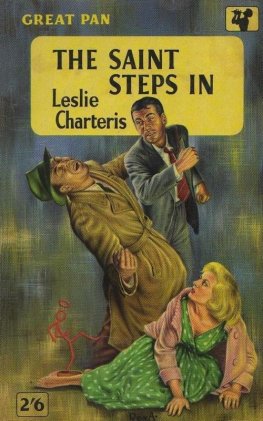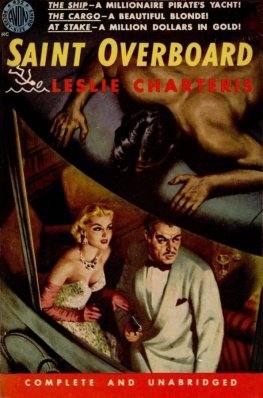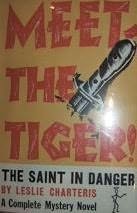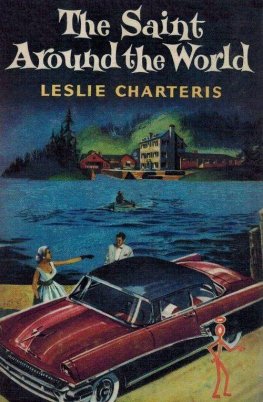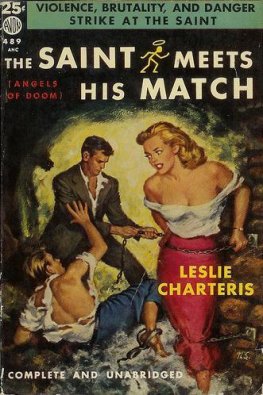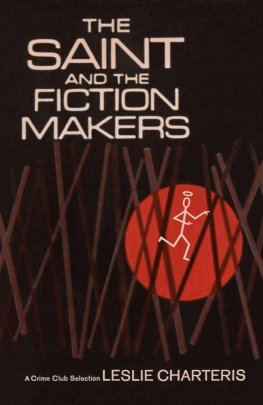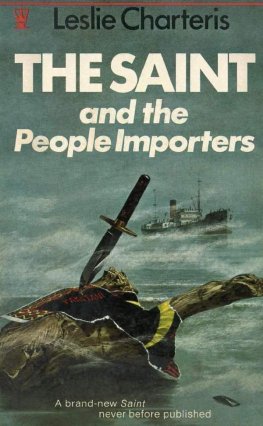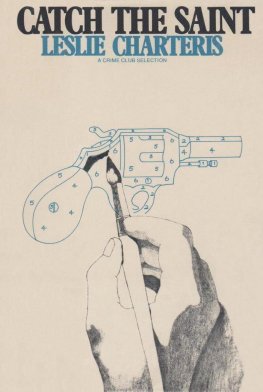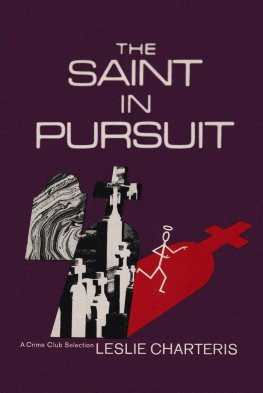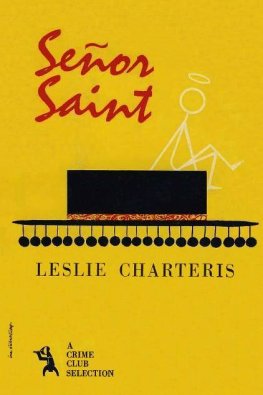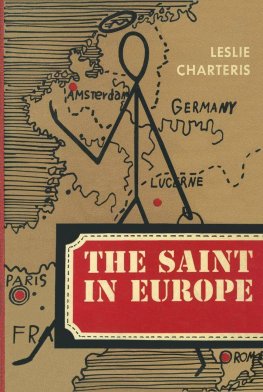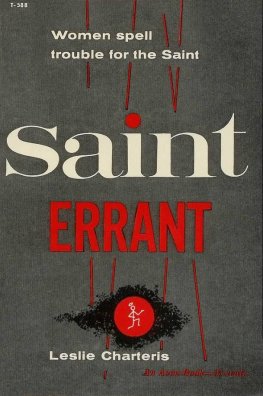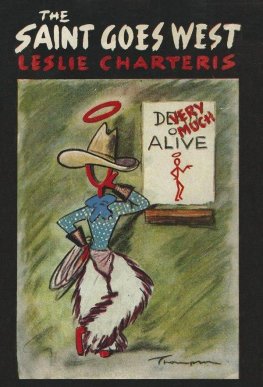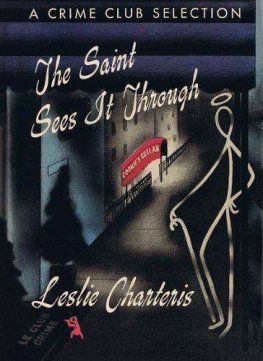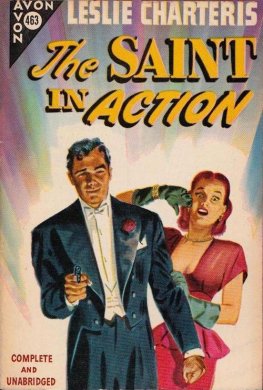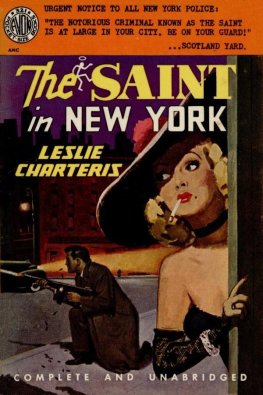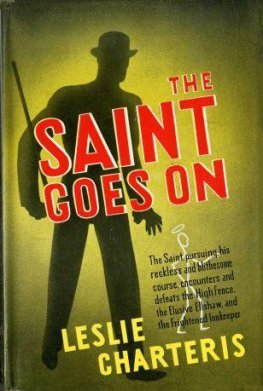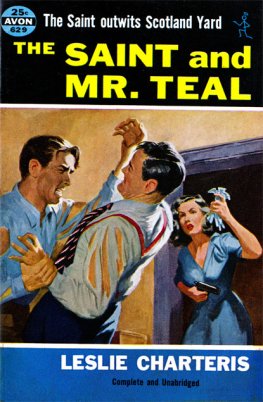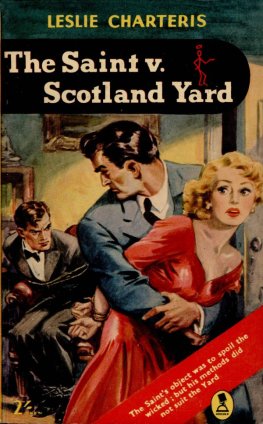Leslie Charteris
The Saint Steps In
1. How Simon Templar dined in Washington,
and Sylvester Angert spoke of his nervousness
She was young and slender, and she had smiling brown eyes and hair the color of old mahogany. With a lithe grace, she squeezed in beside Simon Templar at the small table in the cocktail room of the Shoreham and said:
"You're the Saint."
Simon smiled back, because she was easy to smile at; but not all of the smile went into his very clear blue eyes that always had a faint glint of mockery away behind them, like an amused spectator sitting far back in a respectful audience.
He said: "Am I?"
"I recognised you," she said.
He sighed. The days of happy anonymity that once upon a time had made his lawless career relatively simple seemed suddenly as far away as his last diapers. Not that even today he was as fatefully recognisable as Clark Gable: there were still several million people on earth to whom his face, if not his name, would have meant nothing at all: but he was recognised often enough for it to be what he sometimes called an occupational hazard.
"I'm afraid there's no prize," he said. "There isn't even a reward out at the moment, so far as I know."
It hadn't always been that way. There had been a time, actually not so very long ago, when half the police departments of the world carried a dossier on the Saint in their active and urgent file, when hardly a month went by without some newspaper headlining a new story on the amazing brigand whom they had christened the Robin Hood of modern crime, and when any stranger accosting the Saint by name would have seen that lean tanned reckless face settle into new lines of piratical impudence, and the long sinewy frame become lazy and supple like the crouch of a jungle cat. Those days might come back again at any time, and probably would; but just now he was almost drearily respectable. The war had changed a lot of things.
"I wanted to talk to you," she said.
"You seem to be making out all right." He looked into his empty glass. "Would you like a drink?"
"Dry Sack."
He managed to get the attention of one of the harried waiters in the crowded place, with an ease that made the performance seem ridiculously simple. He ignored the glowerings of several finger-snapping congressmen, as well as the dark looks of some young lieutenants and ensigns who, because they fought the "Battle of Constitution Avenue" without flinching, thought they deserved a priority on service, Washington's scarcest commodity. Simon ordered the Dry Sack, and had another Peter Dawson for himself.
"What shall we talk about?" he asked. "I can't tell you the story of my life, because one third of it is unprintable, one third is too incriminating, and the rest of it you wouldn't believe anyhow."
The girl's eyes flashed around the crowded noisy smoky place, and Simon felt the whirring of gears somewhere within him; the gears which instinctively sprang into action when he sensed the possiblity of excitement in the offing. And the girl's behavior was just like the beginning of an adventure story.
Her voice was so low that he barely caught her words, when she said: "I was going to ask you to help me."
"Were you?" He looked at her and saw her eyes dart about the cocktail lounge again as if she were momentarily expecting to see someone whose appearance would be decidedly unwelcome. She felt his gaze on her and made an effort to ease the tautness of her face. Her voice was almost conversational when next she spoke.
"I don't know why," she said, "but I'd sort of imagined you in a uniform."
Simon didn't look tired, because he had heard the same dialogue before. He had various answers to it, all of them inaccurate. The plain truth was that most of the things he did best were not done in uniforms such as the interesting episode which had reached its soul-satisfying finale only twelve hours ago, and which was the reason why he was still in Washington, relaxing over a drink for the first time in seven very strenuous days. But things like that couldn't be talked about for a while.
"I got fired, and my uniform happened to fit the new doorman," he said. He waited until the waiter placed the two drinks on the table. "How do you think I could help you?"
"I suppose you'll think I'm stupid," she said, "but I'm just a little bit frightened."
The slight lift of his right eyebrow was noncommittal.
"Sometimes it's stupid not to be frightened," he said. "It all depends. Excuse the platitudes, but I just want to find out what you mean."
"Do you think anything could happen to anyone in Washington?"
"Anything," said the Saint with conviction, "could happen to anyone in Washington. And most of the time it does. That's why so many people here have ulcers."
"Could anyone be killed here?"
He shrugged.
"There was a man named Stavisky," he offered, "but of course that was officially labeled a suicide. But I could imagine somebody being killed here. Is that the proposition, and whom do you want bumped off?"
She turned the stem of her glass between her fingers, her head bent, not looking at him.
"I'm sorry," she Said. "I didn't think you'd be like that."
"I'm sorry too," he said coolly. "But after all, you make the most unusual openings. I only read about these things in magazines. You seem to know something about me. I don't know anything about you, except that I'd rather look at you than a fat senator. Let's begin with the introduction. I don't even know your name.
"Madeline Gray."
"It's a nice name. Should it ring bells?"
"No."
"You aren't working for a newspaper, by any chance?"
"No."
"And you're not a particularly unsophisticated Mata Hari?"
"I no, of course not." '
"You just have an academic interest in whether I think it would be practical to ease a guy off in this village."
"It isn't exactly academic," she said.
He took a cigarette from the pack in front of him on the table.
"I'm sorry, again," he said. "But you sounded so very cheerful and chatty about it"
"Cheerful and chatty," she interrupted as the tautness returned to her face, "because I don't want anyone who's watching me to know everything I'm talking to you about. I thought you'd be quick enough to get that. And I didn't have in mind any guy who might be eased off, as you put it."
The Saint put a match to his cigarette. Everything inside him was suddenly very quiet and still, like the stillness after the stopping of a clock which had never been noticed until after it left an abrupt intensity of silence.
"Meaning yourself?" he asked easily.
She was spilling things out of her handbag, searching for a lipstick. She found it. The same movement of her hand that picked it up slid a piece of paper out of the junk pile in his direction. Shoulder to shoulder with her as he was, it lay right under his eyes. In crudely blocked capitals, it said:
DON'T TRY TO SEE IMBERLINE
"I never wanted to see him," said the Saint.
"You don't have to. But I've got an appointment with him at eight o'clock."
"Just who is Imberline?"
"He's in the WPB."
The name began to sound faintly familiar; although Simon Templar had very little more general knowledge of the multitudinous personnel of the various Washington bureaus than any average citizen.
He said: "Hasn't he heard about making the world safe for the forty-hour week?"
"Maybe not."
"And somebody doesn't want you to put him wise."
"I don't know, exactly. All I know is that the note you're looking at was tossed into my lap about twenty minutes ago.", Simon glanced at the paper again. It was wrinkled and crumpled as it should have been, if it had been made into a ball, as the girl implied. He said: "You didn't see where it came from?"

